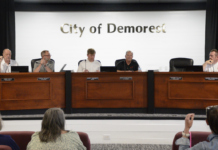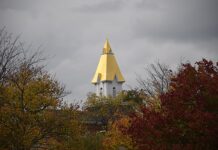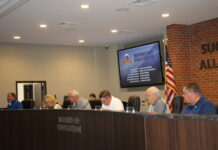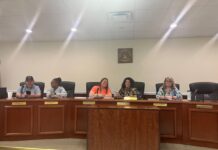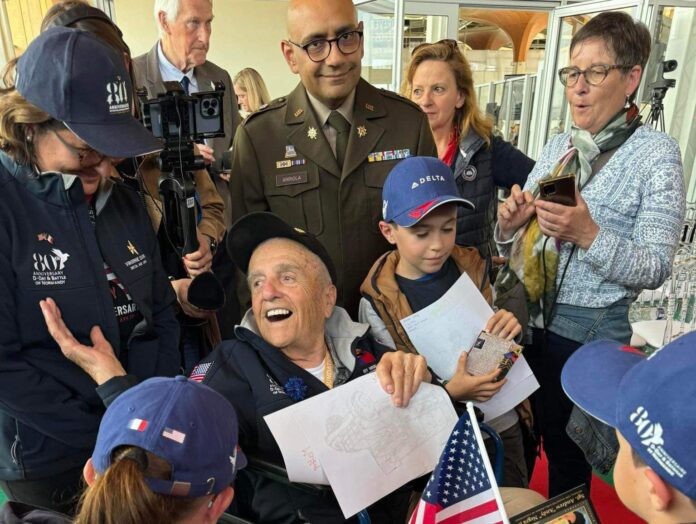
He lays claim to being part of the “Greatest Generation” and at the age of 100, Andrew “Andy” Negra, Jr. of Helen, Georgia, is one of a small number of WWII combat veterans left in this world that they saved.
Negra returned to the beaches of Normandy, France, last month, where more than 4,000 Allied troops died. He journeyed there along with dozens of U.S. WWII veterans to mark the 80th anniversary of D-Day. The group of veterans spent 12 days celebrating, remembering, and commemorating the seminal invasion that led to the liberation of France and Europe.
Returning to Normandy

Negra’s most recent journey back to Normandy began on Sunday, June 2, at Hartsfield-Jackson International Airport. He and 49 other veterans boarded Delta Flight 9994 to return to the shores where they once fought. Other veterans flew in from other parts of the United States and allied nations and were reunited in France, where they were greeted by cheering crowds.
“What many people do not understand is they were the ones invaded. They have a lot to celebrate, and they do,” Negra expressed.
His story is not ordinary, and when talking with Negra, one immediately understands the depth of his life experiences and how his faith and resolve to conquer whatever comes his way are the secrets to his extraordinary life.
“I was 19 years old when I saw Uncle Sam’s finger pointed at me, and I was drafted in 1943, two weeks after I graduated high school,” Negra recounted. “We didn’t know what was going on. We just did what we were told to do. There wasn’t a reason to be scared because we didn’t know what to be scared of.”
Appreciation of France
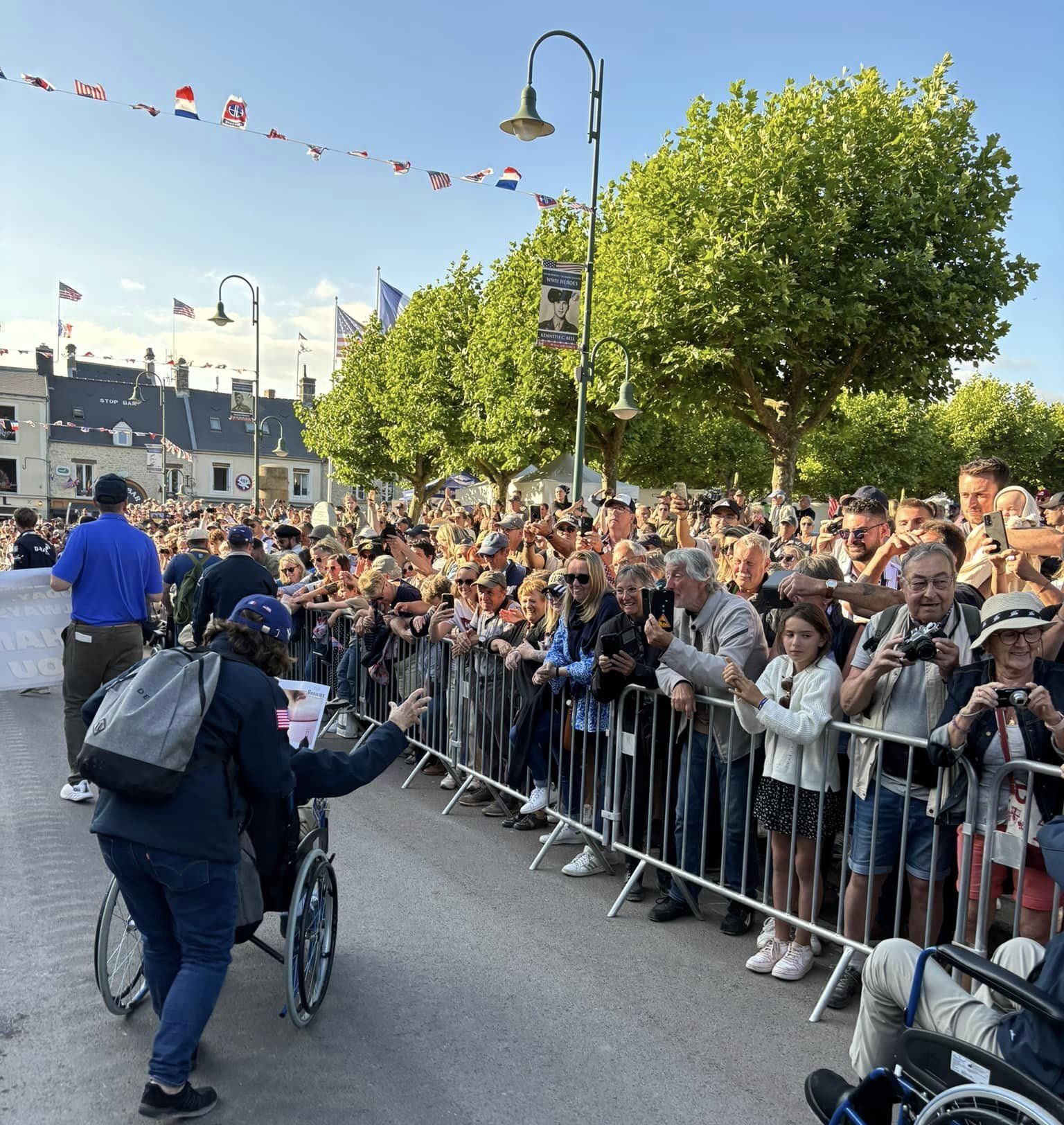
The U.S. Army’s 128th Armored Field Artillery Battalion, 6th Armored Division, landed on Utah Beach in Normandy on July 18, 1944.
“This return trip on the 80th anniversary of D-Day was very special for me and those I traveled with. And the people of France appreciate us more than I can describe because they know we saved them,” Negra told Now Habersham.
Negra is the only surviving member of the 128th Armored Field Artillery Battalion.
“I saw a lot of bad things and a lot of death. God has gotten me through many situations I probably shouldn’t have gotten through.”
Negra’s early life
Born May 28, 1924, in Brownsville, Pennsylvania, to immigrants from Austria-Hungary, Negra was the third of four children and the son of a coal miner. His parents came to America in 1910 to work in the coal mines. They lived in a two-bedroom home with an outside toilet and no electricity. Negra’s mom left when he was a young teen.

“We learned to take care of ourselves,” Negra said of his childhood. “We had 15 churches in our town and just as many bar joints. The state police would raid the gambling joints about every two years, but someone also got a tip they were coming. Owners would clear out the new equipment and put in old. The state police would take the old equipment, the owners would put the new equipment back in, and they were back in business.”
Negra began his basic training at Ft. Bragg, North Carolina. “The first thing we were told is to ‘Forget your name, you no longer have a name, you’re a number, and always remember it.’”
When the group got off the train and started marching, Negra heard the sergeant yelling at some guy in the back. “Hey you, in back, get in step, left, right, left, right…’ and I kept thinking some dumb guy didn’t know his left from his right. A guy tapped me on my shoulder and said, ‘Hey you, left, right, left, right … ’ The dumb guy in the back was me. I was marching at my own pace and not paying attention.”
Andy and Viola
Negra met his wife, Elizabeth Viola Stanton, shortly after he’d finished training at Ft. Meade, Maryland. He was walking around and heard music.
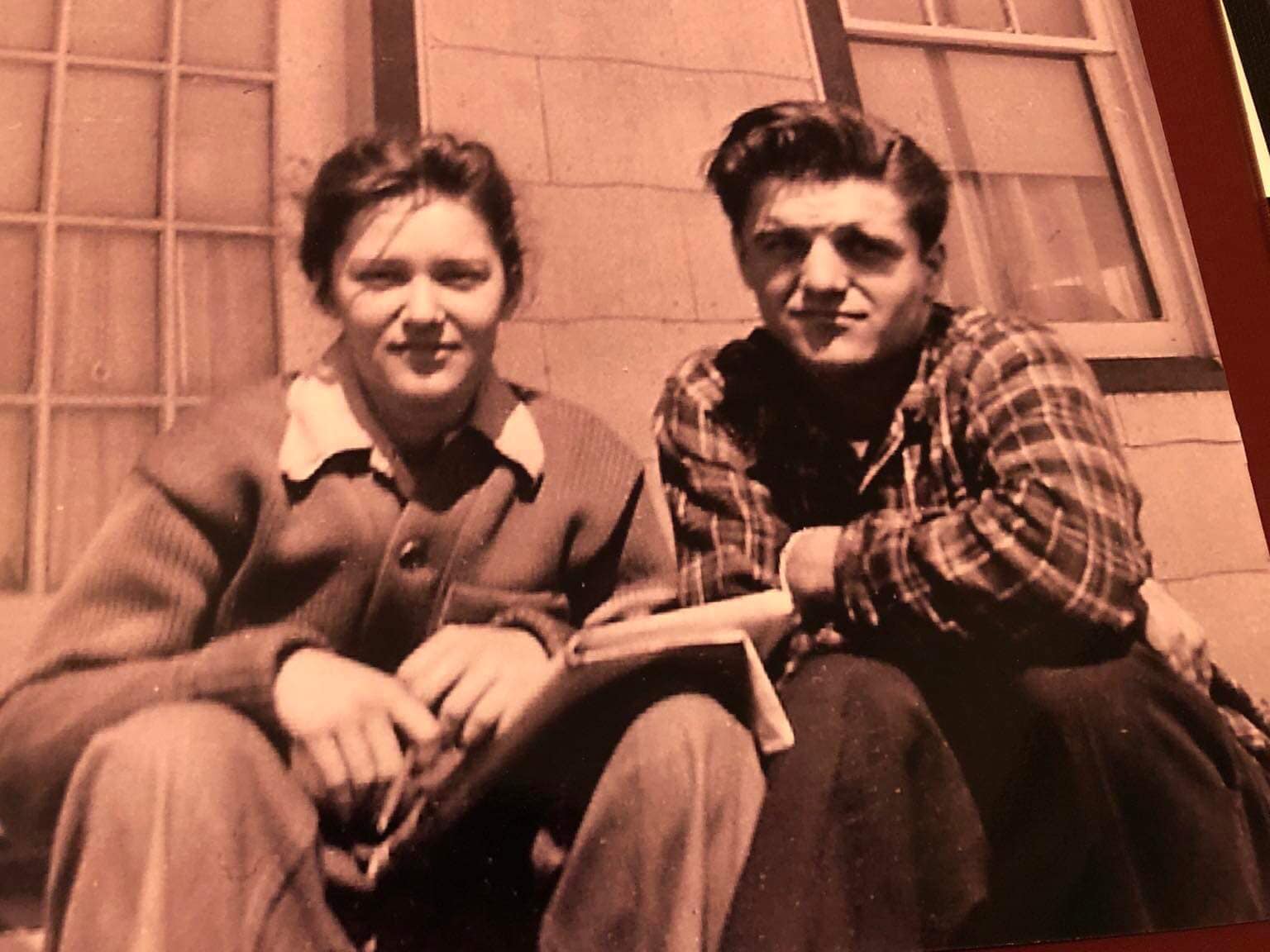
“I found the place, walked in the hallway, and there was a dance floor. There was this one girl not dancing. She was the most beautiful person I’d ever seen,” Negra said.
He asked her to dance to “People Will Say We’re In Love” from Oklahoma.
“It was our song for the rest of our lives,” Negra added. At the time he met Viola, she was 17 years old.
The two were married for 71 years and raised three children. They welcomed the births of grandchildren, great-grandchildren, and six great-great-grandchildren.
Returning to Normandy
Negra has traveled to France twice in the past year. He returned to Normandy in 2023 for the 79th anniversary.
“Being on Omaha Beach struck me real quick. It was the main part of the invasion of France. And I could see all those boats. I could see the soldiers coming in facing the Germans,” he reminisced. “Utah Beach was right beside Omaha Beach, where our unit landed.”

Negra talked about returning to those shores and how the French people received them more than three-quarters of a century later.
“The children know the history. We visited a school, and all the children came out waving American flags. They know what the Americans did to save France. Their appreciation is overwhelming.”
Dinner with President Macron
Private events were held for the veterans. Negra enjoyed dining with the French President and First Lady, Emmanuel and Brigitte Macron. He said they had invited him and his daughter, Mary, to return in July.
The Mayor of Saint Marie du Mont welcomed the veterans to Utah Beach. Negra gave a speech to all those in attendance.
“The children were dressed as soldiers and hurried to meet all of us. We were treated with great respect,” Negra said. After his speech, wreaths were laid in remembrance of those who lost their lives on D-Day.
“Our children need to be taught about the history of World War II. They need to understand what was at stake. If we had lost, nothing would be as it is today,” Negra added.
Negra’s secret to life

Often asked what the secret is to his longevity, Negra said, “Have a positive attitude. God only gives us one day at a time. That’s all we’re promised.”
He added, “We are all going to have tough days, live the day anyhow. There is so much good around us, but many people don’t see it. God has given us so much.”
Veteran Affairs statistics show that 16.4 million Americans served in the Second World War. Just over 100,000 are still living.
Negra says he will outlive them all.
“I work hard to take care of myself,” he said. “I’m on my way to make a second 100.”
When Negra returned from France, he was greeted with over 100 cards from all over the world, and he is taking his time going through each one.
“I live each day enjoying what has been given to me.”


